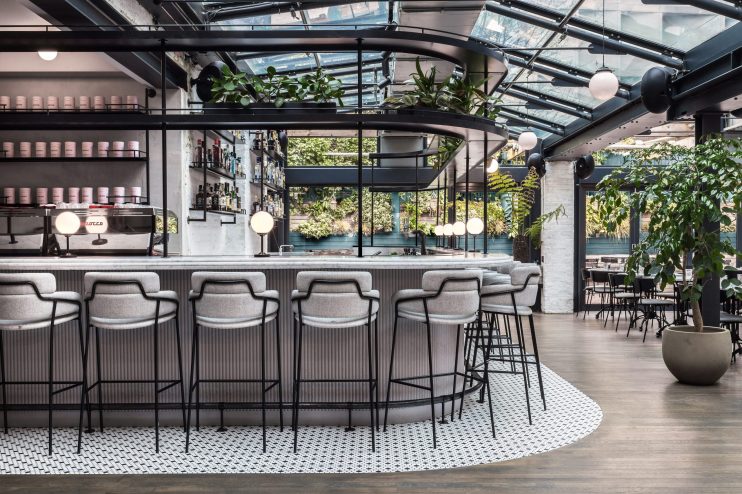Survive and thrive: Back to the grind stone at a cult coffee favourite

London’s businesses have been forced to weather a storm they never saw coming, but many have pivoted to new ways of doing business. Today, David Abrahamovitch – founder of coffee brand GRIND – writes for City A.M. on the way he’s changed his business during the pandemic, and the challenges of the ‘new normal’
The week before lockdown was one of the hardest of my life. We closed almost all of our locations and furloughed the vast majority of our team. Initially, we kept a few open for takeaway only, and offered free coffee to the NHS, but as the lockdown took hold it became clear that we needed to close completely. It took nearly ten years to build one of London’s best-loved hospitality brands, and less than ten days to shutter it. Overnight, our high street sales went to zero.
We were due to open another two London locations of our own this year (2020), as well as our first three ‘Grind to Go’ locations in London mainline railway stations. Our first airport location was planned for 2021. Before the lockdown hit, we were on track to deliver sales to December this year of over £20m and employed 300 people. Now, we’re in survival mode, more than 90% of our team are furloughed and our expansion plans are on hold.
Read more: London needs its hospitality businesses back up and running
The silver lining is that in 2019 we did two things to diversify the business: we moved into a huge new coffee roastery in Elephant & Castle to roast coffee for our own sites as well as our wholesale partners like Soho House Group, and we launched a new range of coffee products for our customers to order and subscribe to through our website. We called it ‘Grind at Home’ – selling our whole bean and ground coffee, as well as the UK’s first compostable coffee pods for Nespresso machines. Little did we know that what started out as a small side-project would become a lifeline for the business when the Coronavirus hit.
Since lockdown has set in, we’ve been blown away by the support from our regulars, as well as thousands of others looking to make great coffee at home. While we were closing the doors of our cafés, our online sales exploded – growing over fifteen-fold in the last 6 weeks – with thousands of people joining us as subscribers and receiving letterbox-friendly coffee deliveries as they need them. We’re now shipping out more than 5,000 packages every week, containing our Grind pink coffee tins, or refill packs to those who already have one.
Grind at Home has gone from a tiny fraction to our only source of income – which on an annualised basis would now represent close to 40% of our revenues pre-Coronavirus. If it sustains after lockdown this will be a huge change for the business. Grind at Home’s growth has meant we are now accelerating plans to expand the service across Europe and the US, much earlier than planned. We hope that this growth will give us greater resources to re-build on the high street.
It isn’t exactly the business we set out to build, and it feels almost daily that our teams, investors, landlords, and the bank, all ask me the same question – when will you re-open?
The reality for the hospitality business, particularly in London, is that social distancing is simply not viable. In our Soho and Covent Garden stores, we could probably have less than ten people inside if they all have to be 2m apart.
Social distancing aside, our locations are mostly in places where people work or meet, and where tourists go – like Liverpool Street and London Bridge. Commercial rents in London are amongst the highest in the world, but these areas are not places where many people live, so without the foot traffic of London’s shoppers, office workers, tourists and students, businesses like ours may not be viable without substantial changes to the rent structure.
London is built to be busy, it’s what makes every business possible, and it’s the reason I love this city. If it’s not busy, it just doesn’t work. I badly miss going to Grind, and I’m desperate to get them open again. At the same time, I’m very aware that re-opening will not be easy, and we must not re-open too soon. We’ve spent ten years bringing people together, but now we have a responsibility to keep them apart. We’re testing out the re-opening of a small part of one of our locations for Grab and Go this week, and after this we’ll then need to take a measured approach to re-opening until the restaurant industry gets up on its feet again.
There’s no doubt that there are difficult times ahead for the hospitality industry, and others. Like everyone, I’ve spent two months thinking about being back open and “back to normal” – but there is no going back, and I’m coming to terms with that now.
We’ll re-open more of our locations as soon as it’s safe to do so – and I’ll be first in a socially-distanced line for an oat flat white each time we do – but at least for a while, things will be different. I don’t yet know just how different – but I do know that like London, we will adapt to a new way of living and working and we will survive, and with a bit of luck we’ll be the better for it on the other side of all of this.